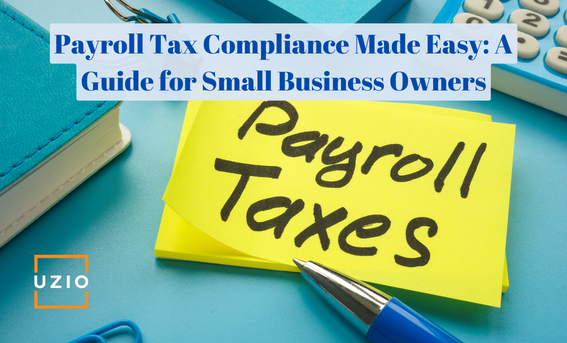
Payroll Tax Compliance: Essential Tips for Small Business Owners
Quick links
-
Introduction
-
Your Payroll Tax Obligations
-
Classify Your Employees Correctly
-
Keep Accurate Payroll Records
-
Stay Updated with Tax Law Changes
-
Calculate and Withhold Taxes Correctly
-
File and Remit Payroll Taxes on Time
-
Monitor and Report New Hires
-
Perform Periodic Payroll Audits
-
Conclusion
Introduction
As a small business owner, navigating the complexities of payroll tax compliance can be a daunting task. Failing to meet your obligations can lead to penalties, fines, and unnecessary stress. In this blog post, we will discuss essential tips to help small business owners stay on top of their payroll tax compliance responsibilities and ensure smooth operations.
1. Your Payroll Tax Obligations
The first step in payroll tax compliance is to understand your obligations. Determine which taxes apply to your business, such as federal income tax withholding, Social Security and Medicare taxes (FICA), and federal and state unemployment taxes (FUTA and SUTA). Familiarize yourself with the applicable tax rates, thresholds, and reporting requirements. Register your company with any state agency that you are found to be liable in. For more information on a state by state basis you can navigate through the state site for guidance and information.
2. Classify Your Employees Correctly
Properly classifying your employees as either employees or independent contractors is crucial. Misclassifying workers can result in costly penalties. Understand the legal criteria for employee classification and consult with legal or tax professionals if you have any doubts. If you are unsure of an employee’s classification be sure to withhold as if the employee is not a contractor and is subject to federal and state taxation. This will avoid any unnecessary penalties and/or interest charges on tax liabilities.
3. Keep Accurate Payroll Records
Maintain accurate payroll records for each employee, including their wages, hours worked, tax withholdings, and benefits. These records should be organized and accessible for at least three years to comply with IRS regulations. If you are using a payroll service be to download and save all your payroll records with each run to ensure you have all the information you will need.
4. Stay Updated with Tax Law Changes
Payroll tax laws are subject to regular updates and changes. Stay informed about federal, state, and local tax law modifications that may impact your business. Subscribe to reputable tax resources, consult with a tax professional, or attend workshops and seminars to stay up to date.
5. Calculate and Withhold Taxes Correctly
Accurate tax calculation and withholding are vital to avoid penalties. Use reliable payroll software or consult with a payroll service provider to ensure correct calculations based on the latest tax rates, exemptions, and deductions. Remember to withhold federal income tax, Social Security tax, Medicare tax, and any applicable state and local taxes.
6. File and Remit Payroll Taxes on Time
Meeting filing and remittance deadlines is crucial to payroll tax compliance. File required tax forms, such as Form 941 or 944 for federal taxes and applicable state tax forms, accurately and on time. Make timely payments of withheld taxes to the appropriate tax authorities.
7. Monitor and Report New Hires
To comply with federal and state laws, report new hires to the appropriate agencies promptly. This helps prevent fraudulent activity, supports child support enforcement efforts, and ensures compliance with reporting requirements.
8. Perform Periodic Payroll Audits
Regularly review your payroll processes and records to identify any discrepancies or errors. Conduct internal audits to verify that your payroll system is functioning correctly and that all necessary tax deductions, benefits, and contributions are being handled accurately.
Seek Professional Assistance: If you find payroll tax compliance overwhelming or have complex payroll structures, consider seeking professional assistance. Hiring a certified public accountant (CPA) or utilizing the services of a payroll provider can help ensure accurate tax calculations, reporting, and compliance.
Payroll tax compliance is a critical aspect of running a small business. By understanding your obligations, maintaining accurate records, staying informed about tax law changes, and seeking professional assistance when needed, you can streamline your payroll processes and avoid costly penalties. Stay proactive and diligent in your payroll tax compliance efforts, and your business will operate smoothly while staying on the right side of the law.
Recommended Reading: Biggest pain point with Payroll and HR software
Conclusion
Payroll tax compliance is a complex and ever-changing landscape, but it is essential for small business owners to stay on top of their obligations. By following the tips in this blog post, you can streamline your payroll processes and avoid costly penalties.
Stay proactive and diligent in your payroll tax compliance efforts, and your business will operate smoothly while staying on the right side of the law.
In addition to the tips mentioned in this blog post, there are a few other resources that small business owners can utilize to help them stay compliant with payroll tax laws. These resources include:
- The IRS website: The IRS website has a wealth of information on payroll tax laws, including forms, instructions, and publications.
- The Small Business Administration (SBA): The SBA offers a variety of resources to help small businesses with payroll tax compliance, including webinars, toolkits, and publications.
- Payroll service providers: Payroll service providers like UZIO can help small businesses with all aspects of payroll, including tax calculation, withholding, filing, and remittance.
By utilizing these resources, small business owners can ensure that they are in compliance with payroll tax laws and avoid costly penalties.
Get in touch with us for an expert-led demo to know more about UZIO payroll services.





